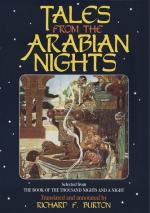This Ms. terminates The Nights with the last tale and has no especial conclusion relating the marriage of the two brother Kings with the two sisters.
Appendix II.
I.—Notes on the stories contained in volume xiv.[FN#640]
By W. F. Kirby.
Story of the Sultan of Al-yaman and His Three Sons.
P. 5.—The hippopotamus has also been observed, at the Zoological Gardens, to scatter his dung in the manner described.
P. 7.—It is evident from the importance which the author attaches to good birth and heredity, that he would hardly approve of the Socialistic custom, so prevalent in the East, of raising men of low birth to important offices of State.
The Story of the Three Sharpers (pp. 10-23).
P. 10.—In quoting the titles of this and other tales of the Wortley Montague Ms., in which the word Ja’idi frequently occurs, Scott often wrote “labourer” or “artisan” instead of “sharper.” The term “sharper” is hardly applicable here, for the fellows appear really to have possessed the knowledge to which they laid claim. The “sharpers” in this story differ much from such impostors as the Illiterate Schoolmaster (No. 93, vol. v. pp. 119-121), who escapes from his dilemma by his ready wit, or from European pretenders of the type of Grimm’s Dr. Knowall, who escapes from his difficulties by mere accident; or again from our old friend Ma’aruf (No. 169), whose impudent pretensions and impostures are aided by astounding good luck.
P. 13.—This test was similar to that given to Ma’aruf (vol. x. pp. 16,17), but there is nothing in the latter passage to show whether Ma’aruf had any real knowledge of gems, or not. In the present story, the incident of the worm recalls the well-known incident of Solomon ordering worms to pierce gems for Bilkees, the Queen of Sheba.
P. 13.—English schoolboys sometimes play the “trussing game.” Two boys have their wrists and ankles tied together, and their arms are passed over their knees, and a stick thrust over the arms and under the knees, and they are then placed opposite each other on the ground, and endeavour to turn each other over with their toes.
P. 15 note.—Can the word Kashmar be a corruption of Kashmiri?




